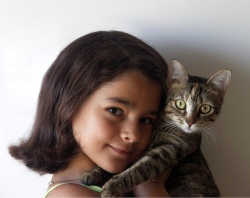Cats and children

Many children want pets and cats are high on the list of desirable pets. On the other hand many parents feel that they have enough on their plate looking after the children without adding a pet to the mix. And it is true that a cat comes with the responsibility of some additional work, care and financial commitment. This is why adopting a cat should only be done after careful consideration, especially if this is your first adoption. Always remember that as they say 'a cat is for life not just for Christmas'.
|
You are getting the cat for your children, but you will be responsible for the cat, not the children. (Even though it is an excellent idea to get the children involved in caring for their pet.) Many recent studies by child psychologists show real benefits for children who have a pet. For example, cat ownership teaches children responsibility, respect and compassion, and it gives them a friend for life. |
How do I choose the best cat for my children?
Although kittens are often the first choice, they may not be the best choice. This is especially true in a household with very young children. Kittens are fragile and can easily be hurt unintentionally. Children often don't realize how easy it is to harm a kitten. Kittens are also young and without much self-restraint, so are more likely to scratch or bite without realizing that this is wrong.
So if you have young children (i.e. less than 9 years old), you may be better off adopting an adult cat. Choose a friendly cat. Spend some time playing with the potential adoptee and see how she responds to being patted, stroked or picked up. Not all cats like being picked up and carried around - but some love it. Pay particular attention to the cat's body language. If the cat is upset when an adult picks her up, the same cat might panic when a child picks her up and won't let her go. If you are adopting a cat from a rescue centre ask the staff for the cat's background. Choose a cat which has been brought up in a family with children. Some cats which have never been among children find them too loud and threatening.
Although there is no hard rule, some breeds are more easy-going than others and may be more suitable for children. Those include Abyssinian, Maine coons or Ragdolls. We feel it is inadvisable to try crosses with part-wild ancestry such as Savannahs, though some people will insist that their Savannahs are excellent with children.
Educating children
Although some children can be instinctively good with animals, most need guidance as to how to play with and care for their pet. Get them some books about cats and cat care and carefully explain to your children your new cat's needs. Remember that cats are mostly nocturnal animals and they will frequently nap during the day. Although most cats do not object to being stroked and petted they will need some time out in a quiet,secure place. It is best to schedule playtimes is early evening. Most cats are fully awake then and ready to play. A routine daily playtime will help to develop a bond between children and the cat. Remember that every play should be strictly supervised. Make sure that children know how to pick up a cat safely and stroke gently. The best cat toys are those on a string, because there is less possibility of the child getting an accidental scratch or bite when the cat pounces on a toy.
Also make sure that children know how to watch out for the cat during their daily activities. Being aware of the cat's whereabouts will reduce the danger of children (and adults for that matter) accidentally treading on the cat's legs or tail. It is also important to teach children never to bother the cat when eating or using her litter tray. Cats are more likely to respond aggressively when interrupted at these times. Also if the cat is bothered while using the litter tray, she may decide to find a quieter spot - such as the carpet under your bed.
Should children be given some responsibilities for cat's care?
Children should definitely play some part in cat care. The extent will depend on how old and how responsible the children are. Certainly, even young children can feed their cat and make sure that the cat has water. Feeding is an almost certain way to any cat's heart and will help in creating a strong bond between child and cat.
Older children can brush the cat (if the cat is willing to be brushed), play with the cat or even change the litter (remember to stress the importance of doing this hygienically). But make sure that children don't end up with all the dirty work. Also check that the cat has been attended to. Even with the best intentions children are often forgetful which may mean that the cat will suffer - for example if the children forget to feed her. It is a good idea to put notes in some visible place reminding the children of their responsibilities, a fridge door being a very good example of such a site.
Finally don't be alarmed if the cat does not immediately bond with the children. For a start, the cat will initially be very frightened of her new environment. She is likely to hide from everyone while she works out her place in the household. So it may be an idea to make sure that the cat feels comfortable in her new home before even introducing the children. You can find more information about adopting a cat in our 'get a cat' series of articles and in particular in the article 'Bringing your cat home - the first few days.'
